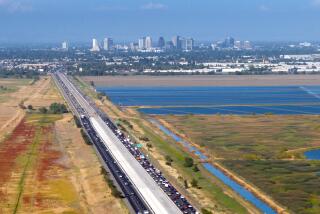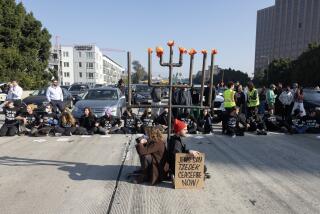National Agenda : Roadblock Ahead! : Britain’s ambitious highway program--’the greatest since the Romans’--is running a gantlet of political and environmental attacks.
- Share via
LONDON — Britain’s nationwide freeway system is taking a U-turn, with both popular and political sentiment turning against the multilane roads known here as motorways.
The reversal is tipping a long-held policy that more and better roads were needed to accommodate growing auto and truck traffic in a country that has loved the car since it was invented a century ago.
Now a Transport Department plan to build a nationwide highway grid similar to systems in other major countries is flagging in the face of environmental and political resistance. The momentum seems lost.
Free-wheeling nations such as the United States, Germany, Italy and France have long had national networks of high-speed, multilane, limited-access highways. Britain has always lagged behind, completing a ring road around London long after similar peripheral freeways were built around Paris and Rome.
The political struggle began in 1989, when the government proclaimed a national roads program featuring a massive building campaign costing up to $3.5 billion a year, based on predictions that traffic would increase by as much as 142% between 1988 and 2025.
It was dubbed “the greatest road-building program since the Romans.”
But the government projections, critics pointed out, seemed to indicate that traffic demand would still outstrip any expansion of the road system and that congestion would become even worse.
As Phil Goodwin, head of a transportation studies unit at Oxford University, put it at the time, “No realistic main road program can keep pace with forecast traffic growth.”
So not only were the numerical projections daunting for government planners, the planned expansion was colliding head-on with growing environmental objections to the prospect of wide ribbons of concrete crossing the green English countryside.
Following the most recent wave of opposition to completing freeway links--and widening those that are already overburdened--the government of Conservative Prime Minister John Major seems to have thrown in the towel. Construction has been delayed on several major projects.
The Transport Department had planned to widen the M25 motorway, which circles London and connects to motorways heading out of the capital. The ring road was designed to carry 100,000 vehicles a day, but it is already burdened with about 165,000 daily--with predictions of thousands more to come. Traffic on the M25 slows to a crawl several times a day.
To ease the load, the idea was to widen the M25, using adjacent link roads, to 14 lanes in the most heavily traveled segment on the west side of London. The link roads allow cars to move short distances on the motorway without mixing in the heavy traffic of the main lanes.
Initially, the plans met little objection. But then environmental groups weighed in, condemning motorway widening as both harmful to green space and ineffective in solving traffic problems.
Leading activist Emma Must, a former librarian and official with Alarm UK, the umbrella organization for anti-roads protest groups, argued that widening motorways simply attracts more traffic--and not new businesses--and is a no-win idea. The countryside of England, she and others charged, would be paved over, covering open spaces much like the Los Angeles freeway system blanketed Southern California in the 1960s and 1970s.
That radical view was soon seconded by Britons outside the usual realm of London’s pressure politics, creating a powerful political combination.
Countering the environmentalists, leading Conservative Cabinet members such as Trade and Industry Minister Michael Heseltine insisted that widening the M25 is vital to the national economy. They note that all traffic between southeast Channel ports and northern cities must use the M25 to bypass London and that the frequent gridlocks are damaging commerce.
But environmentalists found support among other Conservative members of Parliament, those who represented suburban constituencies bordering the capital’s orbital motorway. One, Conservative MP and former Cabinet minister Kenneth Baker, declared: “At 14 lanes, the M25 would have a devastating environmental impact on the quality of life of my constituents.”
The combination of Greens and breakaway Tory MPs was too much for the government, which announced that the general widening of the M25 with link roads would be abandoned and that the road would be only widened at key points.
The writing on the wall was clear: If the government couldn’t justify major widening of the busiest motorway in the country, how could it justify other motorway expansion plans in the face of growing protests?
It was a sharp turnaround for the Transport Department, which previously had been able to overcome environmentalists who picketed and blockaded widening and bypass projects of major motorways throughout Britain.
The major fights had been against the extension of the M11 motorway into east London, with opponents blocking work crews by squatting in buildings earmarked for removal. They also launched high-profile campaigns against the extension of the M3 motorway around Winchester in south-central England, the M77 near Glasgow, Scotland, and a bypass near the city of Bath in the southwest.
Most recently, environmentalists had taken to the treetops in an attempt to prevent construction crews from cutting down foliage for a long-planned, $128-million link for the M65 to Blackburn near Liverpool. Security for the project has cost $3.5 million in the past two months.
The treetop protesters were finally removed and the bulldozers moved forward, but similar projects remain in jeopardy.
Environmentalists have outmaneuvered the road lobbies, representing truckers, motorists, construction firms and businesses, all of whom insist that Britain complete a first-rate freeway system. On a map of the motorway system, there are spurs and unfinished bits of road ending abruptly nowhere near their target connections. And the betting is that it will be a long time before they are completed--if ever.
“As the M25 decision indicates, it is becoming equally difficult to build roads around towns, and this announcement essentially spells the end for suburban motorways,” transportation specialist Christian Wolmar said.
To reduce congestion, various alternative plans have been put forward, such as charging tolls on motorways or forcing heavy trucks to stay off secondary roads, particularly those that go through villages.
With public indignation seemingly set against the expansion of the motorway network, the government may have to put more resources into railroads and alternative forms of public travel.
In the long run, the protesters insist, the country may be better off if commuters coming into city centers have decent trains to take, with park-and-ride plans, and if truck traffic is moved by rail.
“What we are now seeing is a cutback in spending on new roads,” activist Must said. “What we are now waiting for is to see whether the money that has been saved will be spent on improving public transport.”
Transportation expert Wolmar added: “Last year, a Transport Department committee reported that building new roads in itself generates further traffic, thereby undermining the case for building them in the first place. We are entering the foothills of a new transport policy.”
Flushed with success, protest groups have announced that they will hold a series of protests against exhaust pollution.
Jonathan Bray of Alarm UK said: “We want to take on the car culture head-on. A lot of the more controversial road-building plans have been already been dropped so we are making plans to bring central London traffic to a standstill as a protest against auto pollution.”
Truncated Traffic
Britain’s incomplete motorway system has gaps and spurs that lead nowhere.
More to Read
Sign up for Essential California
The most important California stories and recommendations in your inbox every morning.
You may occasionally receive promotional content from the Los Angeles Times.













